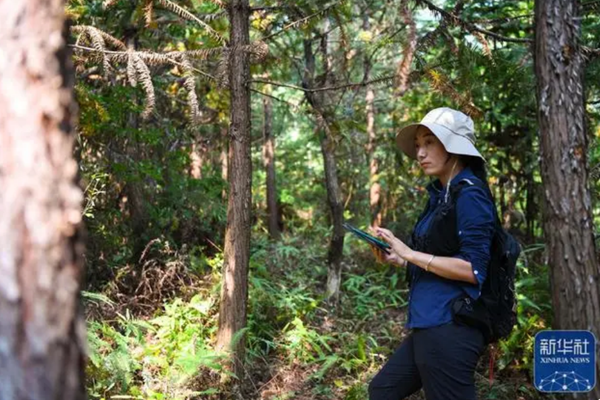'Guardian Angels' of Wetlands
Wetland conservation is not only an important means to conserve biodiversity and cope with climate change, it is also a vivid practice of China's conservation of "lucid waters and lush mountains." Like "guardian angels" of local wetlands, and other natural resources, numerous residents (including many women) of various regions of the country have played important roles in conserving the resources during the past decade.
'Most Beautiful Aunt' on Urban Wetlands
Zhou Yuqing, 70, is referred to as the "most beautiful aunt" on urban wetlands in Guiyang, capital of Southwest China's Guizhou Province. She became an environmental volunteer in 2008, soon after she retired from Guizhou Wangwu Prison (in Guiyang). During the past 15 years, she has exerted every effort to protect the environment of regions close to urban wetlands (in Guiyang), and to promote China's environmental-protection efforts.
In August 2014, Zhou established Yuanmeng Aixin Society, a volunteer-based organization in Guiyang. During the past several years, she has led the society's members (including many retirees) in conducting activities involving wetland conservation, in publicizing scientific information about environmental protection (among residents), and in collecting litter near the river (close to their community). During the past decade, the society's 168 members, combined, have provided more than 13,000 hours of voluntary services to residents. In June 2022, the Ministry of Ecology and Environment and the Office of the Central Guidance Commission for Building Spiritual Civilization of the Communist Party of China named Zhou one of the 100 most beautiful volunteers (in China) dedicated to protecting the ecological environment.

Blooming 'Kelsang Flowers' in Forest
Baila Quzhen, a 20-something woman from Bome (a county in Nyingchi, a city in Southwest China's Tibet Autonomous Region), is an assistant forestry engineer with Guangdong Forestry Survey and Planning Institute (in Guangzhou, capital of Guangdong Province). She began working at the institute in May 2020.
Walking through the woods, on the mountains, Baila and her colleagues often collect data (related to forests, grasslands, wetlands and other natural resources), through which ecologists can learn about the ecological changes in the resources (in Guangdong), and then scientifically evaluate the quality and ecological status of the resources, to provide policy-making support for ecosystem conservation, restoration, supervision and management.
In June 2021, the Guangdong Federation of Trade Unions organized a speech-making contest among workers (in various trades) in Guangzhou. Many of the spectators were impressed by Baila's passionate speech, on how she struggled to adapt to her new life when she began working in Guangzhou. She vowed to make greater contributions to building Guangzhou into a better place by saying, "I am like red kapok flowers in Guangdong and colorful kelsang flowers in my hometown (Tibet). Moistened by rain and dew, I will add beauty to spring in return." The speech earned her the gold medal.
Keeping River Clean
More than 10 years ago, Zhang Banggui, a resident of Hanshuiyuan (a village in Ningqiang, a county in Hanzhong, a city in Northwest China's Shaanxi Province), traveled several kilometers, every day, between Hanshuiyuan and the mountains (near the village). Why? He was collecting litter near the Han River and on the mountain path. Although he has passed away, Zhang's descendants, and an increasing number of villagers and volunteers, have been following in his footsteps and collecting litter (along the way), to keep the river clean.
Valuing ecological and environmental protection, Ningqiang in recent years has advocated the harmonious coexistence between humans and nature, and has stuck to the path of green and sustainable development.
To protect the river's clean water, Ningqiang during the past several years has closed 10 mines, and has conducted ecological projects to promote the conservation and restoration of wetlands and the forests. The county has yielded fruitful results in promoting the development of its ecological economy by establishing a tea garden, a fungus garden, a medicinal garden, a fruit garden and a vegetable garden. In addition, Ningqiang has grown a combined 330,000 mu (22,000 hectares) of forests. In 2021, the Ministry of Ecology and Environment named Ningqiang a national demonstration area of ecological civilization construction.
(Source: Xinhua/Women of China English Monthly February 2023 issue)
Please understand that womenofchina.cn,a non-profit, information-communication website, cannot reach every writer before using articles and images. For copyright issues, please contact us by emailing: website@womenofchina.cn. The articles published and opinions expressed on this website represent the opinions of writers and are not necessarily shared by womenofchina.cn.








.jpg)

 WeChat
WeChat Weibo
Weibo 京公网安备 11010102004314号
京公网安备 11010102004314号